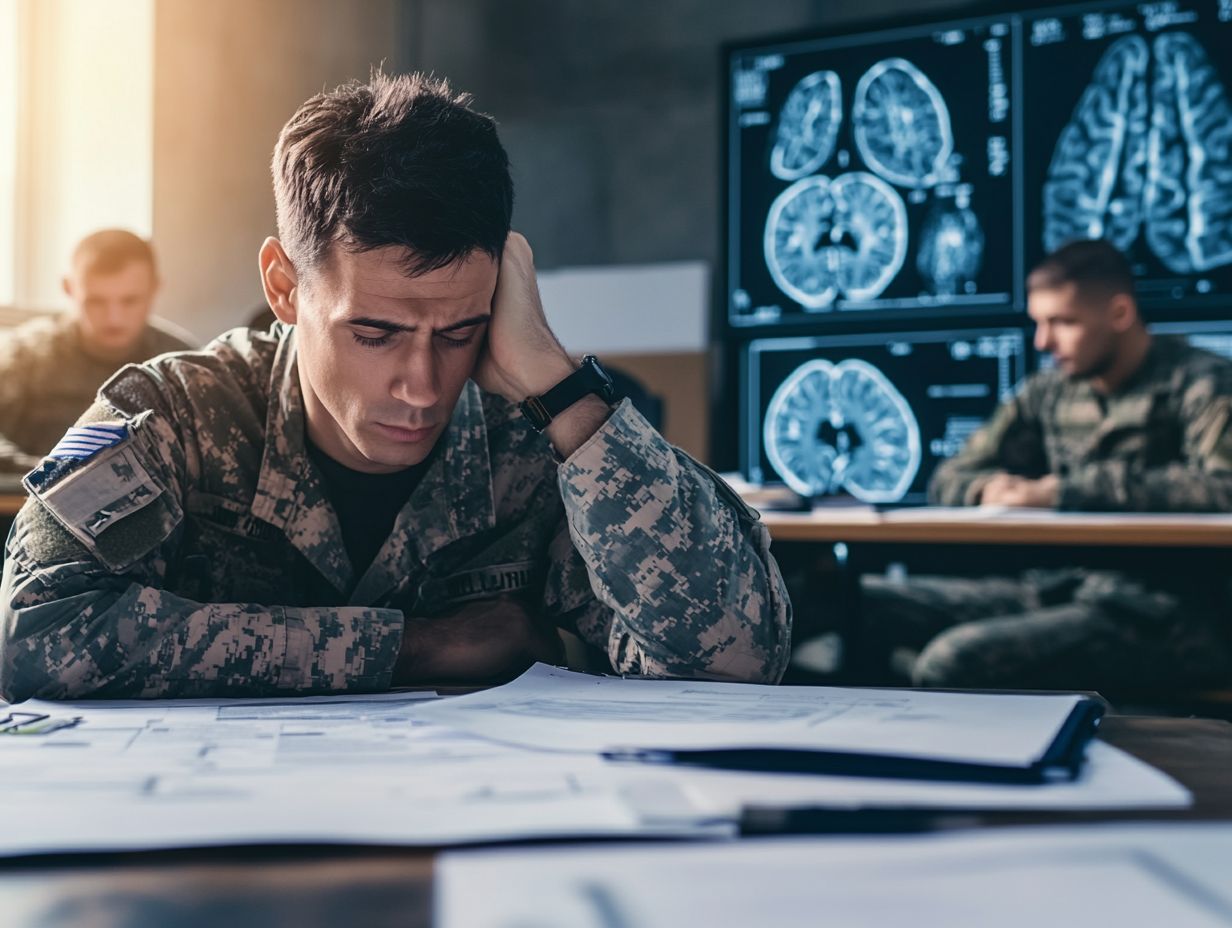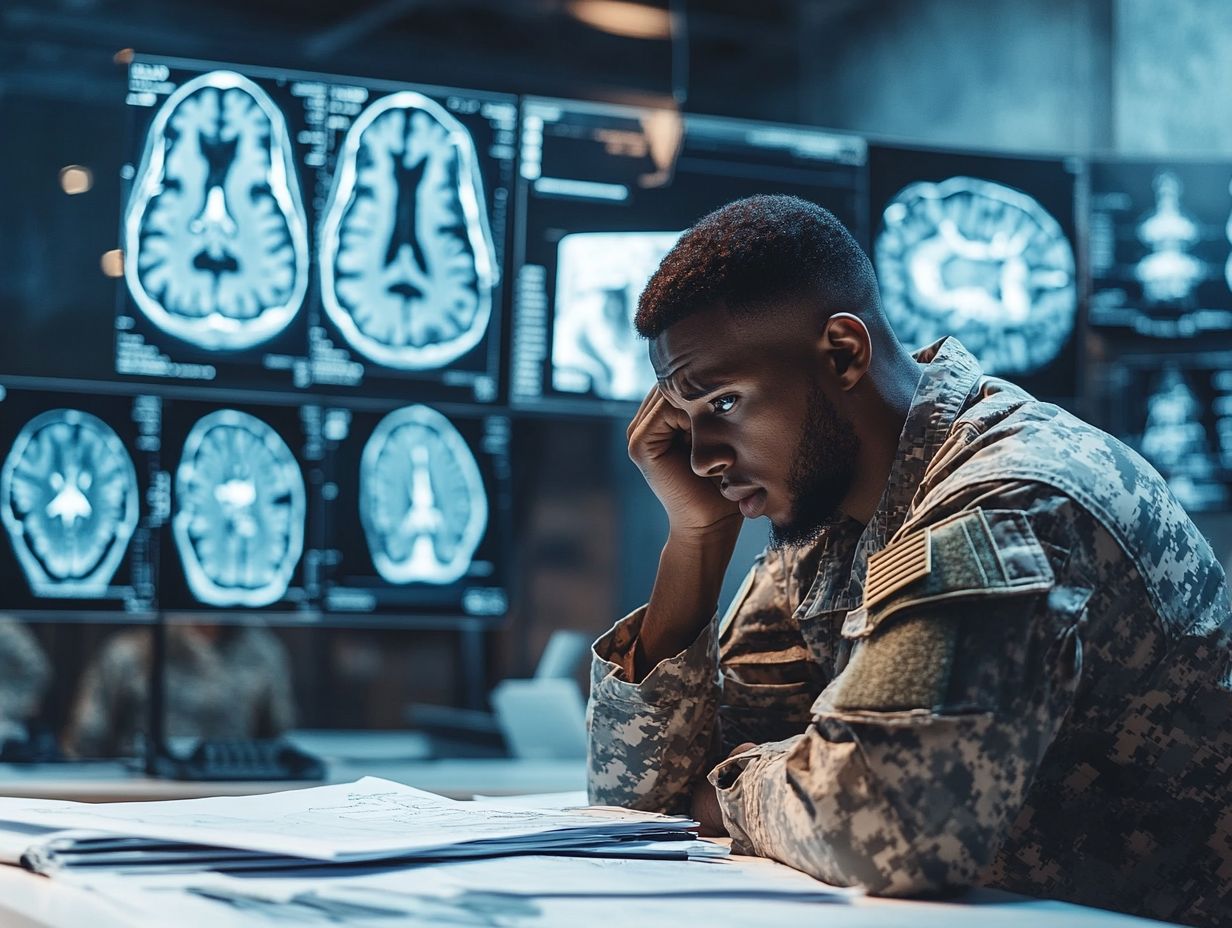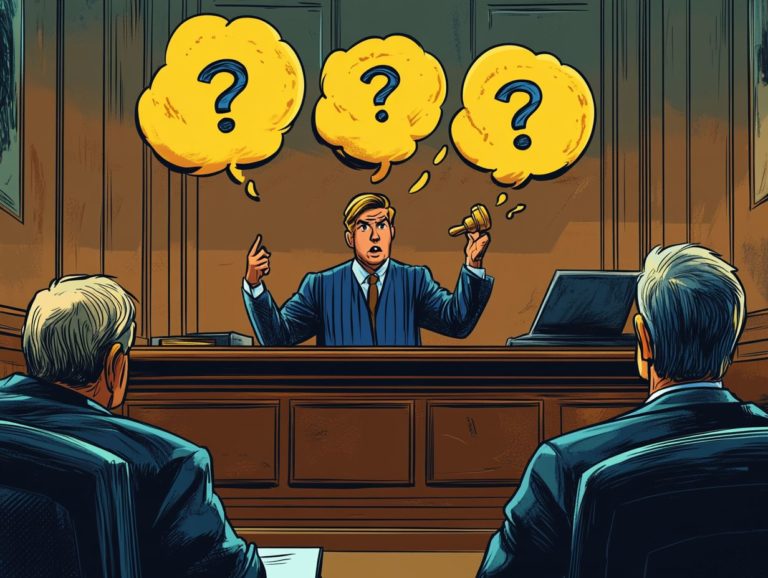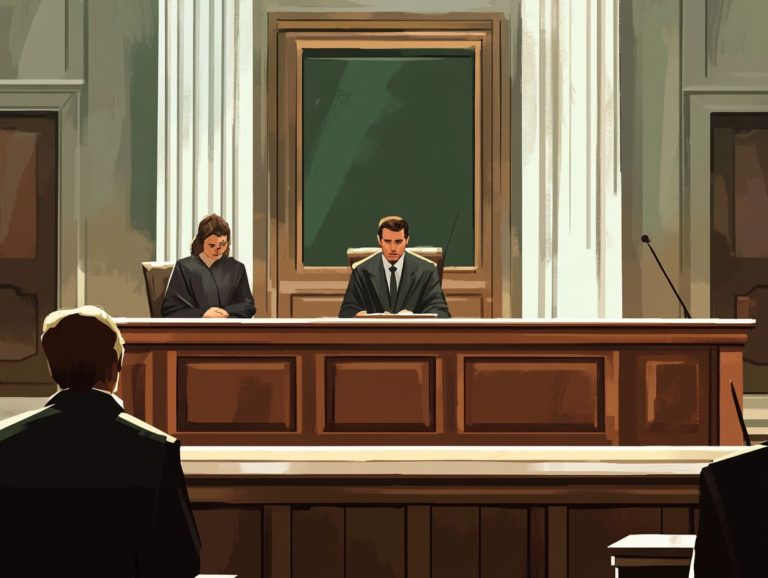The Impact of Mental Illness on Defense Strategies
Mental illness profoundly impacts the criminal justice system, influencing not just defendants but the entire legal process. Understanding is essential for grasping how mental health issues can affect legal outcomes and defense strategies.
This article delves into the prevalence of mental health issues among individuals facing charges, examining the most commonly encountered conditions and how these can complicate defense strategies. It also highlights the challenges attorneys face in dealing with these challenges and outlines resources available to support defendants during these difficult times.
Grasping these dynamics is essential for cultivating a more equitable legal environment for everyone involved.
Contents
- Key Takeaways:
- Mental Illness in the Criminal Justice System
- Types of Mental Illness Commonly Seen in Defendants
- How Mental Illness Can Affect Defense Strategies
- Addressing Mental Illness in the Courtroom
- Supporting Defendants with Mental Illness
- Frequently Asked Questions
- What is the impact of mental illness on defense strategies?
- How does mental illness impact the effectiveness of defense strategies?
- What are some common defense strategies that may be impacted by mental illness?
- Can mental illness lead to unhealthy coping mechanisms?
- How does treatment for mental illness impact defense strategies?
- How can understanding the impact of mental illness on defense strategies help improve mental health treatment?
Key Takeaways:

Defendants with mental illness are prevalent in the criminal justice system, affecting their ability to participate in their defense and impacting case outcomes. Common mental illnesses among defendants include schizophrenia, bipolar disorder, and depression, which can lead to challenges in communication and decision-making during defense proceedings. Defense attorneys must consider the potential effects of mental illness on their clients’ cases and may need to utilize interventions such as therapy or medication to support their defense strategy.
Mental Illness in the Criminal Justice System
Mental illness significantly impacts the criminal justice system, shaping how cases involving individuals facing charges are handled in Colorado Springs and beyond. Defendants might struggle with severe mental illnesses like schizophrenia or PTSD, conditions that can sway legal outcomes and influence defense strategies. The insanity defense argues that a defendant was not responsible for their actions due to severe mental illness, while claims of diminished capacity assert that a defendant’s mental state impairs their ability to understand their actions.
Seeking proper legal advice from a knowledgeable criminal defense attorney can guide you through these intricate issues, ensuring that defendants receive fair treatment during trials.
The Alarming Reality of Mental Illness in Criminal Cases
The prevalence of mental health issues among those involved in criminal behavior is truly alarming, especially in places like Colorado Springs. Here, factors such as PTSD and substance use disorder have a profound impact on public safety and the overall well-being of the community.
Research shows that nearly one in five inmates grapples with a serious mental health condition, complicating their path to rehabilitation and reintegration into society. Conditions like PTSD, often intensified by traumatic experiences, can lead to increased aggression and impulsivity. Meanwhile, substance use disorder may drive individuals to commit crimes as a way of coping or securing drugs.
These interconnected challenges not only threaten community safety but also place significant strain on public resources. This scenario underscores the urgent need for integrated mental health services that can effectively address these disorders within the criminal justice framework.
Types of Mental Illness Commonly Seen in Defendants
In the arena of criminal litigation, you’ll frequently encounter a spectrum of mental illnesses among defendants. These can range from severe conditions like schizophrenia and bipolar disorder to antisocial personality disorder.
Each of these diagnoses presents distinct challenges that must be navigated carefully, influencing both the legal proceedings and the strategies employed in defense.
If you or someone you know is struggling with mental health issues and facing legal challenges, it is crucial to seek legal help. Support systems that address both mental health and legal issues foster a sense of hope and can lead to better outcomes.
Overview and Characteristics

Understanding mental illnesses is essential for effective legal defense. Conditions such as schizophrenia, bipolar disorder, and antisocial personality disorder each present unique challenges and diagnostic criteria.
For instance, schizophrenia often manifests through delusions and hallucinations. This significantly impairs an individual’s perception of reality and influences their behavior.
Bipolar disorder causes extreme mood swings, leading to periods of mania and depression that impact decision-making capabilities and emotional stability.
Antisocial personality disorder is marked by a blatant disregard for moral standards and a lack of empathy. This complicates assessments of criminal responsibility.
By understanding these psychological disorders, you bolster your legal defense and illuminate potential mitigating circumstances, indicating that the individual may lack the capacity for rational judgment due to their mental state.
How Mental Illness Can Affect Defense Strategies
Mental illness profoundly influences the development of defense strategies in criminal cases.
As a defendant, you may utilize conditions such as diminished capacity a legal term referring to reduced ability to understand the consequences of actions or the insanity defense to argue against criminal liability. This not only shapes your legal arguments but also impacts defense attorneys’ responsibilities and obligations.
Challenges and Considerations for Defense Attorneys
Defense attorneys face numerous challenges when representing clients with mental illness. Gathering supportive evidence and conducting thorough psychiatric evaluations are crucial in establishing both criminal responsibility and viable defense strategies.
Navigating these cases requires a sensitive approach, as these topics can significantly influence public perception, juror attitudes, and the overall courtroom dynamic.
It is important to advocate effectively for your clients, balancing the legal ramifications of their mental health diagnoses with the need for treatment and rehabilitation.
Consider implementing strategies such as:
- Collaborating with mental health professionals to secure credible evaluations
- Utilizing expert testimony to provide the court with a clearer understanding of your client s condition
By crafting a nuanced narrative that humanizes the defendant while addressing societal biases, you can foster a more empathetic atmosphere an essential element for ensuring a fair trial.
Addressing Mental Illness in the Courtroom
Addressing mental illness in the courtroom demands careful attention to legal advice and thoughtful evaluation of treatment and rehabilitation options.
This is especially important when navigating complex verdicts such as not guilty by reason of insanity (NGRI).
Possible Solutions and Interventions

Possible solutions and interventions for individuals with mental illness in the criminal justice system emphasize the importance of providing appropriate treatment options and rehabilitation pathways that prioritize public safety while supporting emotional recovery.
These solutions often include a diverse range of evidence-based therapies, medication management, and specialized programs tailored to meet unique needs. When mental health care is effectively integrated into the criminal justice framework, it not only fosters healing for individuals but also contributes to creating safer communities.
Engaging with community resources and healthcare providers is crucial. They can offer ongoing support and guidance throughout the rehabilitation process.
By collaborating with these stakeholders, the criminal justice system can evolve into a more inclusive and compassionate entity, showcasing a genuine commitment to reform and improved outcomes for those facing mental health challenges.
Supporting Defendants with Mental Illness
Supporting defendants with mental illness means ensuring they have access to vital resources, programs, and coping strategies that facilitate their emotional healing and enhance their overall well-being throughout the legal process.
It’s about creating an environment that nurtures their mental health while understanding the justice system.
Resources and Programs Available
A wealth of resources and programs are available to assist you if you re dealing with mental illness, offering treatment options and coping strategies tailored to your unique needs.
These initiatives provide essential support through specialized mental health courts, diversion programs, and community outreach services.
Mental health courts actively work to ensure you receive appropriate treatment instead of facing incarceration, emphasizing rehabilitation over punishment.
Outreach programs frequently link you with local mental health services, legal support, and social services.
Act quickly! You can access these programs through referrals from legal counsel or by contacting mental health organizations directly.
By engaging with these resources, you can experience significant improvements in your mental health, leading to better legal outcomes and enhancing your chances of successful reintegration into society.
Frequently Asked Questions
What is the impact of mental illness on defense strategies?

Mental illness can significantly affect a person’s ability to cope with stress and manage their emotions, which can impact defense strategies in various ways.
How does mental illness impact the effectiveness of defense strategies?
Individuals with mental illness may struggle with distorted thinking patterns or difficulty regulating their emotions, making it challenging to effectively use defense strategies to cope with difficult situations.
What are some common defense strategies that may be impacted by mental illness?
Common defense strategies such as avoidance, denial, or rationalization may be more difficult to use for individuals with mental illness, as their symptoms can exacerbate these behaviors or make them ineffective.
Can mental illness lead to unhealthy coping mechanisms?
Yes, individuals with mental illness may be more likely to rely on unhealthy coping mechanisms such as substance abuse, self-harm, or isolation to manage their symptoms.
How does treatment for mental illness impact defense strategies?
Treatment for mental illness, such as therapy or medication, can help individuals learn healthier coping mechanisms and develop more effective defense strategies to manage their symptoms and improve their overall well-being.
How can understanding the impact of mental illness on defense strategies help improve mental health treatment?
By recognizing the influence of mental illness on defense strategies, mental health professionals can tailor treatment plans to address these specific challenges and help individuals develop more effective coping skills to manage their symptoms.
By seeking the right resources, you can take control of your mental health journey today!






